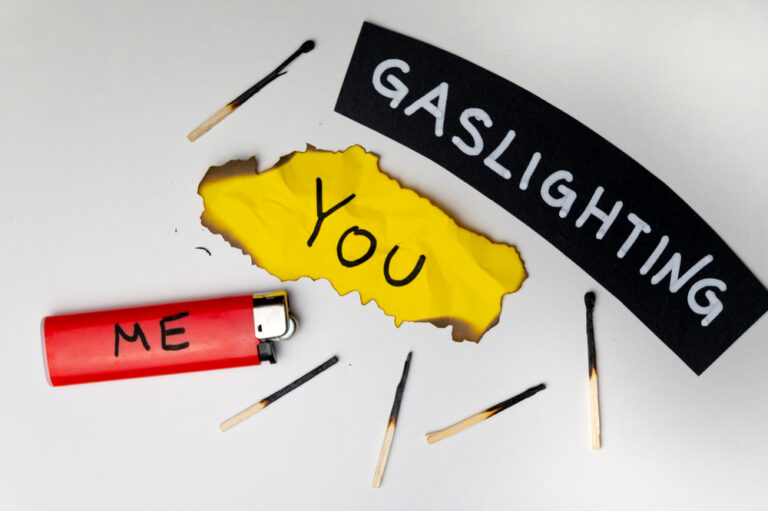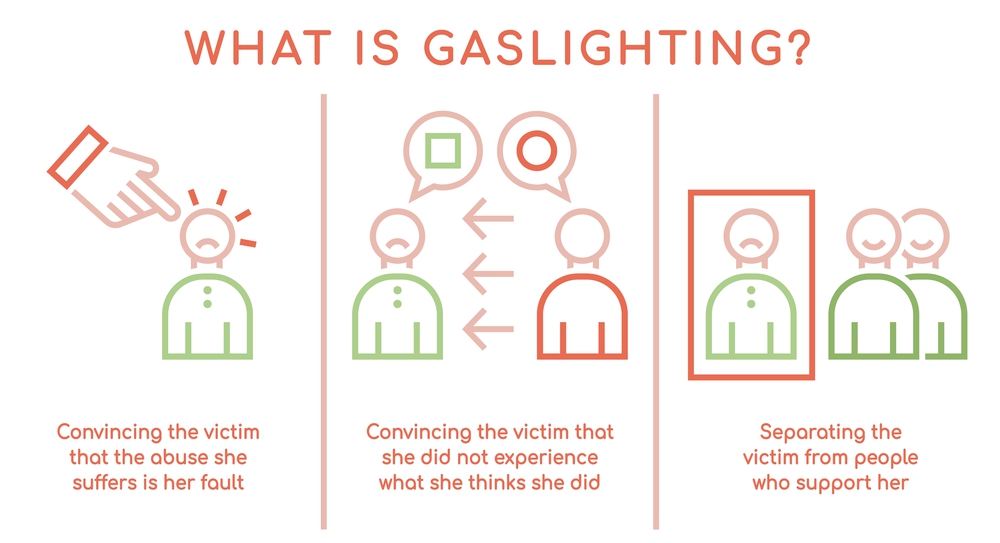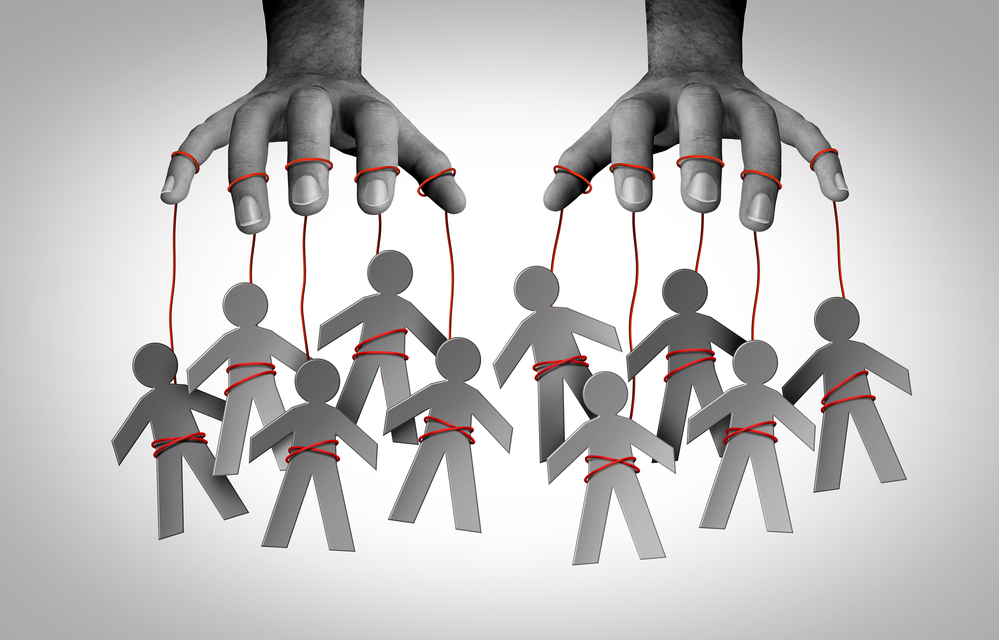What is Gaslighting in a Relationship: Understanding the Manipulative Tactics
 Gaslighting occurs in many types of relationships, but mostly in romantic ones. Through this form of manipulation, one of the parties in the relationship uses emotional abuse, causing their partner to feel as if they are losing their sanity. Let’s take a closer look at what is gaslighting in a relationship. Knowing the manipulative tactics […]
Gaslighting occurs in many types of relationships, but mostly in romantic ones. Through this form of manipulation, one of the parties in the relationship uses emotional abuse, causing their partner to feel as if they are losing their sanity. Let’s take a closer look at what is gaslighting in a relationship. Knowing the manipulative tactics […]Gaslighting occurs in many types of relationships, but mostly in romantic ones. Through this form of manipulation, one of the parties in the relationship uses emotional abuse, causing their partner to feel as if they are losing their sanity.
Let’s take a closer look at what is gaslighting in a relationship. Knowing the manipulative tactics can help you understand if someone is gaslighting you, why it happens, and what to do.
 1. Gaslighting: A Manipulative Relationship Tactic
1. Gaslighting: A Manipulative Relationship Tactic
What is gaslighting in a relationship? Gaslighting, a form of psychological manipulation, is used by one person to make another question their reality, feelings, and experiences as a means of maintaining control over that person.
The term’s origin comes from a British play from 1938 that Alfred Hitchcock turned into a movie called “Gas Light.” The storyline centers around an abusive husband who manipulates things to make his wife question her reality. The disruptions to her surroundings and his efforts to make her second-guess herself leave her feeling neurotic, unsure, and out of control.
Therefore, in gaslighting, there are two people. The gaslighter tries to preserve their sense of self and power in the relationship, and the other person is at the receiving end of the manipulative behavior.
Unfortunately, the person on the receiving end idealizes the gaslighter and wants their approval, making it logical that they start to believe the things the person they love, respect, and trust tells them.
Therapist Aki Rosenberg puts it perfectly in this article in mbgrelationships: “Gaslighting is essentially about self-preservation and the maintenance of power/control by creating a narrative that keeps the gaslighter in the ‘right’ and their partner in the “wrong.”
Gaslighting does not only happen in romantic relationships. It also occurs among family members, in friendships, and in workplaces. Most importantly, gaslighting is a sign of an abusive relationship.
2. Recognizing Gaslighting Behavior: Stay Vigilant
Recognizing gaslighting behavior is crucial for maintaining emotional well-being and psychological clarity because it involves subtle tactics like denial, trivialization, or shifting blame. Stay vigilant and know the signs you need to look out for:
You’re Led to Question Your Perception of Reality
One of the most significant warning signs of gaslighting is that your partner convinces you that you have the wrong perception of what happened, of yourself, your thoughts, feelings, and behavior.
Persistent Lying
People who engage in gaslighting are often chronic and pathological liars who usually also have narcissistic tendencies. They typically don’t back down or change their lie. Even when you can prove they lied, they will distort things by trying to convince you that you’re making things up or are crazy. Of course, this leads to self-doubt.
Discredit You
The person will spread rumors about you to others, often pretending to be worried about you while hinting that you have become emotionally unstable. Unfortunately, they are so convincing that people will believe them without contacting you to discover the whole story. The gaslighter will try to convince you with lies that other people think you are crazy.
Changing the Subject
When you ask the gaslighter a question or try to find out why they did something, they often change the subject to avoid responding by asking you a question about something else. They use this tactic to distract you and change your train of thought. Their end game is to ensure you question yourself about whether you need to press on with the matter.
Minimizing You
With a gaslighter, you always feel that person minimizes your thoughts and feelings. They tell you things like, “You’re overreacting,” “Calm down,” or “You’re always so sensitive?” to show you that you are wrong. Besides never feeling acknowledged or understood, these tactics eventually lead to you questioning yourself.
Shifting Blame
Another common tactic is shifting blame to you for everything that has happened, even when their behavior has caused an issue. They turn the conversation and tell you they would treat you better if you behaved differently.
Compassionate Words to Smooth Things Over
Sometimes, when you call them out or question the person, they try to smooth things over with loving words. They will tell you that they would never hurt you purposefully and tell you that you know how much they love you.
Retell Stories in Their Favor
A gaslighter may retell stories in ways that favor them. For example, if they pushed you against the wall during an argument, they will convince you later that you stumbled, and their attempt to steady you led to you hitting the wall. They’re often so convincing, causing you to doubt if you remember the event correctly.
3. Psychological Abuse Unveiled: Gaslighting Explained
So far, we know that gaslighting is a form of psychological abuse. It’s a form of control that gives the gaslighter power, which the person seeks for various reasons. Therefore, the motives for using this behavior change from person to person.
What is gaslighting in a relationship? Here are its patterns:
Belief That’s the Only Way to Sustain the Relationship – Sometimes, the gaslighter believes that using emotional abuse is the only way to keep the person they want in the relationship.
They Feel Good with Themselves When Controlling Someone Else – Some people can only feel better about themselves when they control others, and it’s easier to do this in a relationship.
They Enjoy the Feeling of Power and Control – Research shows that some people feel pleasure when they have power and control over others.
4. Protecting Yourself: Strategies Against Gaslighting
Even though your gaslighter wants you to feel you are to blame, it’s essential to know that it’s not your fault that you are experiencing emotional abuse. It’s your partner’s choice to make you feel this way. You cannot easily change their actions unless they seek professional help.
However, there are some strategies that you can use against gaslighting to protect yourself:
Take a Step Back - It may help to gain some distance from the forceful emotions that gaslighting evokes. It can help to remove yourself from the situation physically. Try relaxation methods such as breathing or grounding exercises if you can’t distance yourself physically.
Keep Evidence - Gaslighting can make you question yourself. Therefore, keep notes and other evidence of your experiences by saving emails and text messages. Additionally, keep a journal. Use these to look over later if your partner tries to make you question or doubt things.
Set Boundaries – Use boundaries to show your partner what you are willing to accept in your relationship. Make it clear that you won’t allow them to minimize or deny things you have said.
Ask Someone for their Perspective - Talk to someone you trust about your situation and ask them about their opinion. Another person’s perspective can help make the situation more transparent, allowing you to see what’s happening.
End the Relationship - It can be difficult, but ending the relationship with the person is often the most effective way to find the psychological abuse.
It’s always best to speak to a therapist if you think you are experiencing gaslighting in your relationship to gain perspective and learn how to deal with or cope with the behavior.
 5. Gaslighting Signs: Are You Being Manipulated?
5. Gaslighting Signs: Are You Being Manipulated?
It can be hard to realize that you’re experiencing gaslighting when you’re in it. Here are some common gaslighting signs:
Use of “Love” as a Cover
If the person you are with says, “I do this because I love you,” or, “Trust me, this is for the best,” when you feel they are being abusive, controlling, or wrong, it’s probably gaslighting.
Gaslighters often use love to defend their actions, suggesting you don’t love them the same if you disagree with the things they do or say. One example of a gaslighter’s modus operandi is sabotaging a work opportunity or family gathering to gain control over you. They will then justify their action by telling you it was out of concern and their love for you that they did it.
Claims You’re Paranoid
Another common tactic used by gaslighters is to accuse their prey of paranoia – in a relationship, it often happens when they are cheating. Your partner will do this to deflect the problem onto you instead of taking responsibility for the behavior. The person will accuse you of being jealous and over-sensitive and may try to tell you they no longer trust your instincts.
Endless Criticism or Belittling
Often, a gaslighter uses verbal abuse to wear you down in an attempt to keep you in the relationship. Therefore, watch out for criticism and belittling in your relationship. Your gaslighter will try to make you feel that no one else is better for you or that you are unlovable. You will get called “ungrateful,” “crazy,” or “hysterical” to belittle you and make you feel crazy.
5. Healing from Gaslighting: Rebuilding Self-Confidence
The first step for healing from gaslighting is to break the cycle of abuse, which can get tricky because the person will increase their manipulation if they realize you want to leave. It’s critical to distance yourself as much as possible to start your healing from gaslighting.
Now that you know what is gaslighting in a relationship, here’s how to start rebuilding your self-confidence:
Acknowledge and Validate Your Feelings - Recognize and accept the emotions you’re experiencing. Understand that your feelings are valid, and it’s okay to have been affected by gaslighting.
Educate Yourself - Learn about gaslighting and its dynamics. Understanding how manipulation works can help you recognize it in the future and reinforce your confidence in your perceptions.
Seek Professional Support - Consider talking to a therapist or counselor who specializes in trauma or emotional abuse. Professional guidance can provide valuable insights, coping strategies, and a safe space to process your experiences.
Surround Yourself with Supportive People - Connect with friends and family who are understanding and supportive. You must share your experiences with those you trust, allowing them to offer encouragement and validation.
Set Boundaries - Establish clear boundaries with individuals who engage in gaslighting behaviors by limiting contact or cutting ties with them.
Practice Self-Compassion - Be kind to yourself during the healing process. Understand that rebuilding confidence is a journey, and progress can take time. Treat yourself with the same kindness and understanding that you would offer a friend.
Focus on Your Strengths - Identify and celebrate your strengths, skills, and accomplishments. Remind yourself of your abilities and positive qualities to counteract the negative narratives you heard in your relationship.
Challenge Negative Thoughts - Pay close attention to negative thoughts and beliefs about yourself that may have resulted from gaslighting. Challenge these thoughts with evidence of your abilities, worth, and achievements.
Engage in Self-Care - Prioritize self-care activities that contribute to your well-being, such as exercise, healthy eating, adequate sleep, and activities that bring you joy and relaxation.
Set Realistic Goals - Break down your goals for tackling the problem into more achievable steps. Success in reaching these goals, no matter how small, can contribute to a sense of accomplishment and boost your confidence.
6. Gaslighting and Relationships: Breaking the Cycle
Here are five ways you can use for breaking the cycle between you and your gaslighter:
Sort Out the Truth
Robin Stern, Ph.D., stresses in HelpGuide. Org that it’s essential to turn off the gas on your galighter. The first way to do this is to sort out the truth from the distortions of events. Since gaslighters create their versions of events to suit themselves, it’s best to write things said by both of you every time so that you have evidence of who said what.
Look Out for a Power Struggle in Conversations
Gaslighting is so sneaky that you may not always realize the gist of a conversation. Fights often continue for hours, with your gaslighter becoming angrier and more intense as they try to prove they are correct, and you desperately attempt to win them over. If your attempts to convince them fail, you may start to believe their accusations are valid.
Sometimes, the whole incident is based on a power struggle instead of an actual issue. You can tell the difference because you are not taking turns listening and addressing each other; the conversation is intense and concentrated on how wrong you are. If you notice the difference, the best is to opt out by disengaging.
Identify the Triggers
Both partners will have specific triggers that will cause arguments and gaslighting opportunities from your partner. Identify them, and make sure you avoid them. Triggers usually include topics like money, family, behaviors, language, etc. Learn to step away when these situations arise.
Focus on Emotions
Gaslighters often make accusations that ring true, making you feel vulnerable. To free yourself from this trap, focus on your feelings instead of whether they are right or wrong. If you feel remorse, then apologize and try to make up.
However, if you are angry because of unfair accusations criticized, take a deep breath and opt out of the argument with a short statement that doesn’t call for a response. No matter what you did, if you feel attacked, terrorized, or bewildered, your partner is gaslighting you, and you must withdraw.
You Can’t Control Somebody’s Opinion
With gaslighting, you become desperate for your partner to agree you are right. However, they know they have more power over controlling your thoughts than you can control theirs, so no matter what you do or say, they see things their way. It’s better to break the cycle by letting go, no matter how right you are, taking you closer to your release from the relationship.
These are challenging steps, so a therapist or support group can help boost your efforts if you aren’t making progress alone.
7. Gaslighting in Love: Unmasking the Deceptive Tactics
What is gaslighting in a relationship? Gaslighting is the deceptive tactic used to satisfy the needs of one person who wants to prove they are more powerful than you. When even a tiny part of you feels you need the person’s approval, since they always must prove they are right and you must agree, you are prone to gaslighting.
Unfortunately, gaslighting often leads to mental health issues, including anxiety, depression, suicidal thoughts, and addiction. If you are experiencing gaslighting in love, here are the deceptive tactics you must unmask to recognize it:
- You try to persuade yourself that your partner’s treatment of you is not that bad or that you are too sensitive, doubting your feelings in reality.
- You fear speaking up or expressing your emotions because you have started questioning your judgment and perceptions.
- You feel helpless and insecure around your partner. You lack self-esteem and feel like you’re on edge.
- You feel alone, trapped, and powerless because you think everyone around you believes you are “strange” or “crazy,” like your partner who is gaslighting you has said.
- You start to wonder if you are what your partner says you are, and you often repeat their statements to yourself.
- You are disappointed in yourself. You feel like you have become passive and weak compared to the stronger and more assertive person you were in the past.
- Your gaslighting partner’s behavior makes you feel confused because you feel they have two personalities.
- You worry you have become too sensitive because your partner minimizes their hurtful behavior by saying you need to get a thicker skin or that they were joking.
- You feel imminent doom or feel on edge around the person.
- You spend a lot of time feeling like you must apologize for things you do or who you are.
- You constantly feel inadequate and try to live up to your partner’s expectations and demands, even when these are unreasonable.
- You often wonder if you remember details of past events accurately. You may have even stopped trying to share things you remember, fearing they’re wrong.
- You think others are disappointed in you or that you have made a mistake, and always apologize for what you do or who you are.
- You wonder if there’s something deeply wrong with your sanity.
- You don’t trust yourself and struggle to make decisions: You avoid decision-making altogether and prefer to leave it to others.
Now that you know what gaslighting is in a relationship, you have a better understanding of the manipulative tactics and how to avoid them. It is challenging to leave an unhealthy relationship, but it is possible. Whether you do it alone or seek help, once you distance yourself, make it your mission to surround yourself with people who validate your reality and focus on regaining your positivity.


